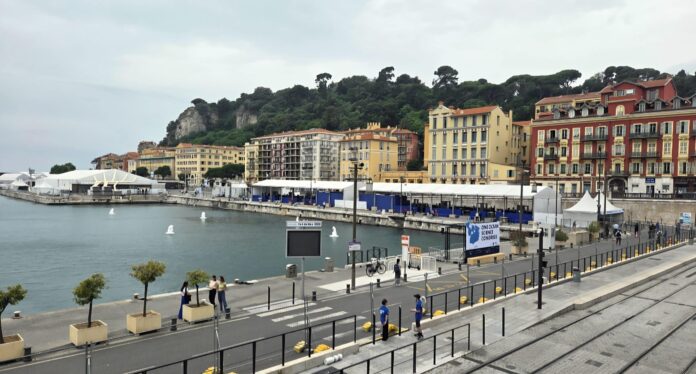From Monday to Friday, Nice hosted the third United Nations Ocean Conference. An exceptional summit at all levels: with a record participation of heads of state and government, massive involvement of scientists, and above all, the strength of the commitments that emerged from it. These are “The Nice Commitments for the Ocean.”
Co-organized by France and Costa Rica, the United Nations Ocean Conference (UNOC), 3rd edition, was held in Nice from June 9 to 13, 2025. It brought together heads of state, scientists, NGOs, businesses, and representatives of civil society around a common goal: to protect an ocean that is severely threatened. UNOC3 established an international roadmap, “The Nice Commitments for the Ocean”, based on five main pillars.
Building Ocean Governance
At the heart of discussions in Nice was ocean governance. This is the essence of the first commitment made by the states present at UNOC3. This governance must be based on better coordination of existing frameworks, particularly those arising from the United Nations Convention on the Law of the Sea, regional fisheries management organizations, and international biodiversity agreements. It must also more fully integrate regional and local authorities, indigenous peoples, and coastal communities.
A particular effort is required to implement, as quickly as possible, the High Seas Biodiversity Treaty (BBNJ), adopted in 2023. This text represents a significant advancement for the protection of areas beyond national jurisdiction, in terms of creating marine protected areas, sharing marine genetic resources, and ensuring transparency in data access. Nice also provided an opportunity to reaffirm the urgency of combating illegal, unreported, and unregulated fishing. This practice destabilizes ecosystems and local economies. The international community has committed to strengthening controls, modernizing surveillance tools, improving information sharing, and ensuring transparency throughout the seafood supply chain.
Financing and Disseminating Ocean Knowledge
To date, according to Reporterre, 99.999% of the deep ocean remains unexplored, despite hosting considerable biodiversity and resources. All participants agreed on the necessity to massively strengthen efforts in ocean research and observation. This involves supporting existing scientific infrastructure, especially the Global Ocean Observing System, developing the capacities of developing countries, and improving data collection. But it also means ensuring equitable access to knowledge. It is now imperative to create conditions that allow all countries, especially those in the Global South, to participate in scientific production and use available data to guide their public policies.
UNOC3 also highlighted the importance of traditional knowledge, particularly that possessed by indigenous peoples, as invaluable sources for understanding marine ecosystems. Academic research and local knowledge must intersect to develop effective policies rooted in real-world conditions. States also reaffirmed their commitment to protecting scientists in the exercise of their duties, ensuring their physical and intellectual safety, especially in sensitive contexts. Finally, UNOC renewed its support for the Decade of Ocean Science for sustainable development, calling for increased initiatives, international cooperation, and funding under this framework.
Mobilizing Financing
For the ambitions of UNOC3 to translate into results, financing appears as a decisive lever. States acknowledged the chronic underfunding of ocean action and committed to reversing this trend. Mobilizing resources, whether public or private, national or international, must be taken to a new level. The Nice summit emphasized the importance of developing innovative financial instruments, such as blue bonds, which direct investment towards projects for the protection and restoration of marine ecosystems.
States also reiterated the importance of gradually eliminating subsidies harmful to the marine environment, particularly those promoting overfishing or habitat degradation. Enhanced support for least developed countries and small island states is another strong commitment, linked to climate justice and international solidarity goals. Finally, participants set an ambitious yet necessary objective: achieving complete decarbonization of maritime activities by 2050, by profoundly transforming models of transport, fishing, tourism, and industry at sea.
Protecting the Ocean from Pollution
Pollution in all its forms is one of the major factors in the degrading health of oceans. In Nice, attention was particularly focused on plastic pollution, which affects entire marine food chains and threatens ecosystems even in the deep sea. States reaffirmed their intention to achieve a legally binding international agreement on plastics, covering the entire life cycle of these materials, from design to recycling. Ninety-five countries signed the Nice Call for an ambitious treaty against plastic pollution. Each year, 460 million tonnes of plastic are produced, a figure that could triple by 2060 without action. This joint declaration calls for reducing plastic production, gradually banning the most harmful products, and improving their design. It also proposes appropriate financing for implementing the treaty.
But the fight against pollution does not stop there. It also involves hydrocarbons, chemicals, industrial and agricultural waste. It extends to micropollutants that affect the reproduction and health of marine species. In Nice, states also recalled the need to protect vulnerable ecosystems, notably the deep ocean. Simultaneously, the restoration of coastal habitats – mangroves, coral reefs, seagrass beds – was presented as a priority for adaptation and resilience to the impacts of climate change.
Accelerating Territorial Involvement
One of the most noted aspects of the Nice summit was the explicit recognition of the crucial role of territories in the blue transition. Far from being an affair reserved for diplomats, ocean protection depends on the ability of municipalities, regions, protected marine areas, and port authorities to act together. UNOC3 encouraged better coordination between local, national, and international levels. It praised exemplary territorial initiatives and called for more support, especially in the most vulnerable regions.
Cooperation between ocean basins – whether in the Mediterranean, the Pacific, the Indian Ocean, or the South Atlantic – were identified as powerful levers for integrated action. The sharing of experiences, pooling of surveillance resources, and logistical and scientific solidarity were highlighted as vectors for blue diplomacy.


